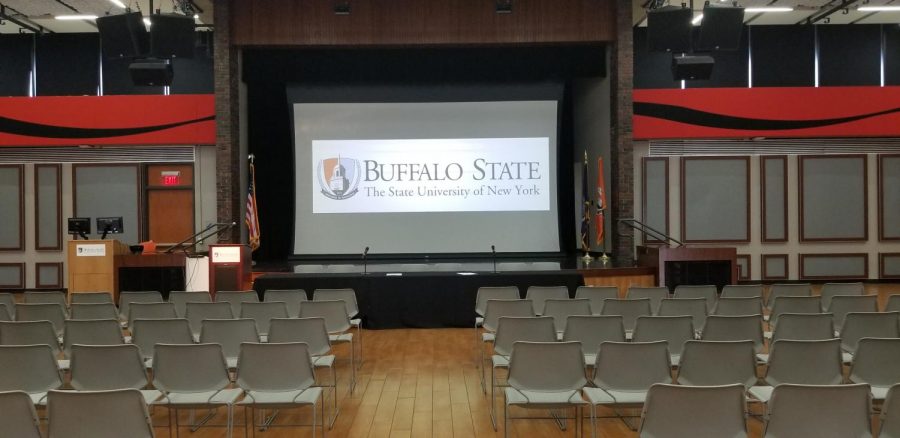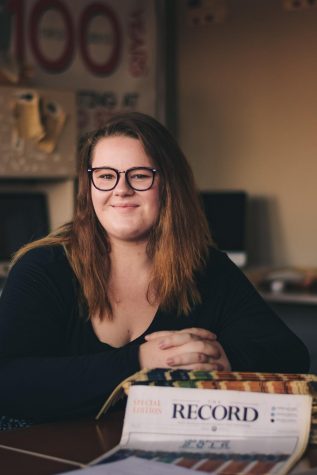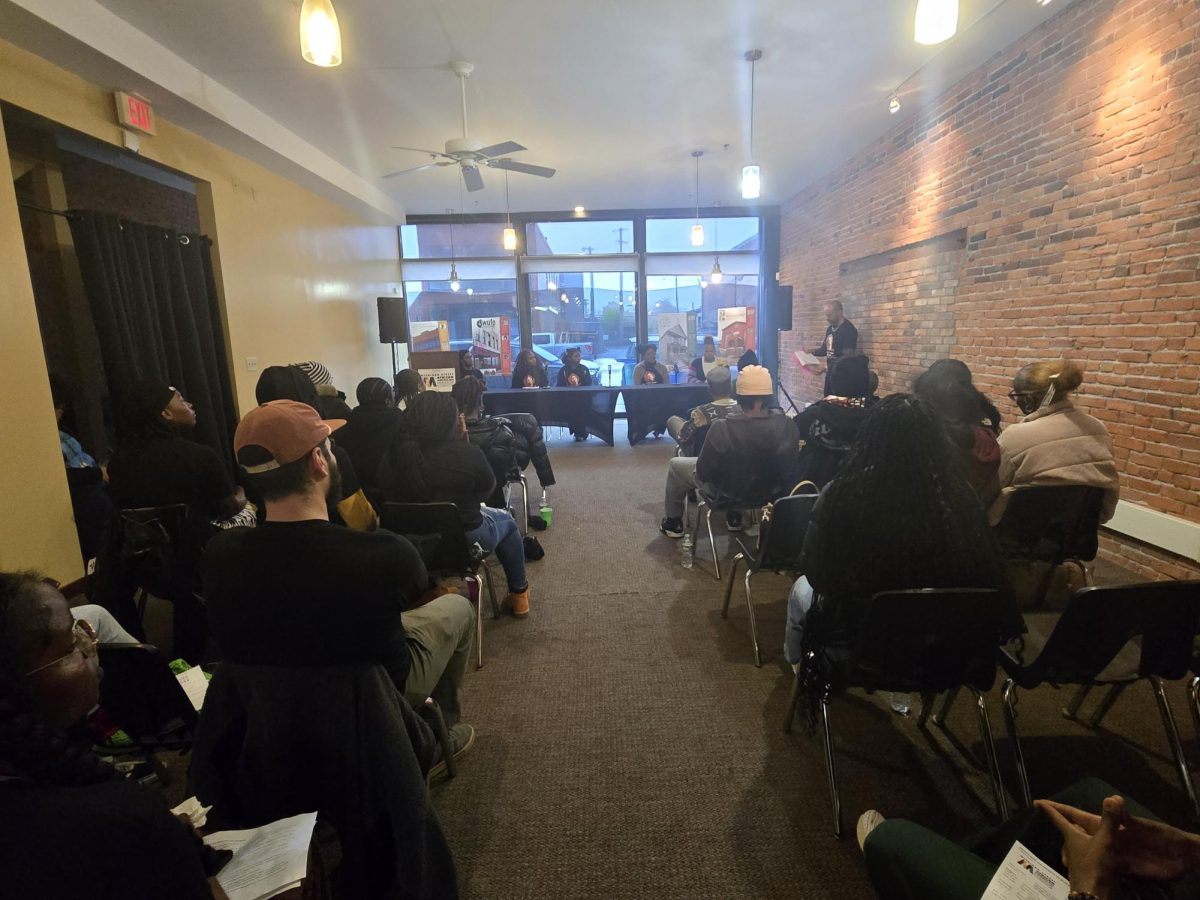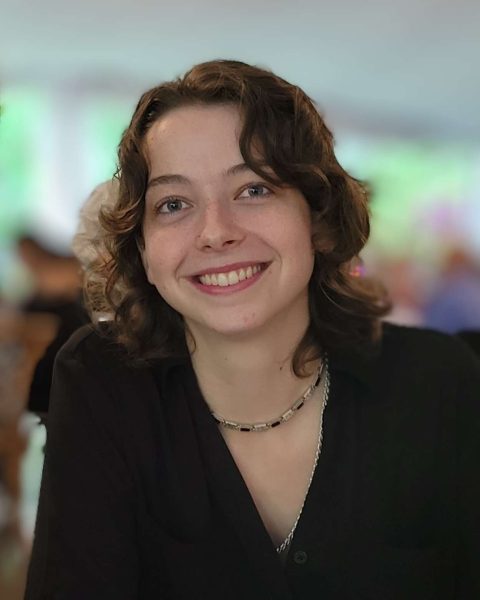Top priorities at SUNY Assembly Conference: Diversity training, plastic bags and safety
December 5, 2018
The SUNY Student Assembly held their semi-annual conference Nov. 16, 17, and 18 with a total of 80 voting delegates representing 46 SUNY campuses.
Both Buffalo State representatives from the United Students Government were voting delegates in the conference. Through the business meetings held in the conference, multiple resolutions were presented to raise a vote. Representatives would introduce their resolution then the delegates would move to question and debate to then vote on the standing resolution.
Resolutions
Diversity Training
Diversity and inclusiveness are a top priority for SUNY campuses. Throughout the Student Assembly Conference, multiple speakers and those on the executive board emphasized the importance of diversity and inclusiveness as they were repeating factors throughout the conference.
Buffalo State was awarded the Higher Education Excellence in Diversity (HEED) Award in 2016.
Adesimisola Tijani, director of diversity, equity, and inclusion proposed a resolution working toward providing diversity training to students during their orientation.
The resolution is primarily for freshmen and transfer students. Voting delegates were concerned with the fact that not all students have the diversity training now and how the training would be implemented.
Overall, the resolutions initiative is to decrease discrimination of all minority groups on campus by having a required training during orientation. The resolution is malleable so schools can best fit the training to their campus.
Contracts could potentially be put in place to verify that new students are fully aware of the consequences that would follow any breaking of the contract.
Ideally, with this resolution, freshmen and transfer students would be partaking in diversity, equity and inclusivity training during the campus orientation. Questions were raised to include freshmen and transfer orientations as well as general undergraduate and graduate orientations.
Then besides the training resolution, adding a more diverse faculty and staff is a larger focus for state universities as a whole. This motion was based around the idea that New York has some of the most diverse campuses, but not always the faculty to represent them according to SUNY Chancellor, Kristina Johnson.
Guided Pathways
While more freshmen are starting their college career with an undecided major, the Chair of Community College Committees presented a resolution to use a “guided pathways” initiative while students are registering for classes.
Advisers would work with freshmen to use their general interests to create a course list, then fit that course list into a major. In the long term, by using their interests, a major would be created to fit more of the student’s likes/wants with college campuses.
Plastic Bag Reduction
Peter York, deputy director of sustainability, presented a plastic bag reduction resolution alongside Richard Caldicott, DGI undergraduate representative and Sean Deery, director of sustainability.
In a general effort of SUNYSA to reduce carbon emissions from campuses by 30% by 2020, a program will be established run by faculty, staff and students to reduce the plastic bag use around campus.
By having stores on campus lessen the use of bags, carbon emission rates from state universities will greatly decrease. The program will also increase the rate at which regular plastic bags are recycled and will educate the campus on plastic waste reduction.
Another relief method mentioned while addressing the resolution was having students recognize how they can individually cut their use of plastic bags.
Ideally, students would use reusable bags in place of plastic bags in use for groceries, carrying things around campus or any other general use.
Student Patrol
A resolution was proposed to implement positions on campus for student safety officers. Though most campuses already have a position in place with University Police or public safety officers, there are campuses within SUNY that do not have set safety positions for students.
Resident advisers essentially have the same role, but their position is limited to the residence halls. The campuses that have these safety officer positions in place, would alter the resolution as needed.
The safety officer position would be paid either through work-study or internships, but Buffalo State’s campus safety program does not fall under either of these categories currently.
Advocacy Agenda
TAP gap
One of the 2019 Student Advocacy Agendas focuses is closing the TAP gap by reimbursing campuses the money lost in tuition.
The funding of TAP is also being considered to join the summer programs. Then, concerning the TAP reform, the DREAM Act, would allow undocumented peoples to obtain tap funding through New York State.
Excelsior Scholarship
The Student Assembly is strongly pushing for New York to help more students from low-income families afford college tuition. By increasing the Educational Opportunities Program budget, SUNY campuses will have more available spots for eligible students.
SUNY will also be making the application process easier for all students and guaranteeing fair treatment of all students who apply.
Emergency Fund
As college students face unexpected financial emergencies, the SUNY Student Assembly urges SUNY to increase the emergency fund across campuses to better support students.
Grants would go to eligible students, whose success in college could potentially be prohibited by a financial loss following tragedy.
Gender Inclusion
As all representatives who attended the conference greatly discussed inclusion and representation of all groups, LGBTQ stands amongst those groups.
The advocacy agenda includes funding to provide more inclusive facilities for both students and staff that are inclusive of gender and offer a third option for those who identify as non-binary or transgender.
Meetings
In a college and universities meeting, the most discussed topics were representation and facilities offered on campuses.
Amongst multiple university campuses, mental health facilities around campuses are not adequately fitting the needs of students.
Anxiety and depression are the leading health issues amongst college students, so it is a necessity to have the right facilities to fully support students of all mental health backgrounds on campus.
Besides mental health, students with disabilities and veterans are also groups that have felt underrepresented within their campuses. Most campuses have student groups that are strictly composed of these student groups to provide representation. SUNYSA will continue to increase the amount of representation throughout campuses.





